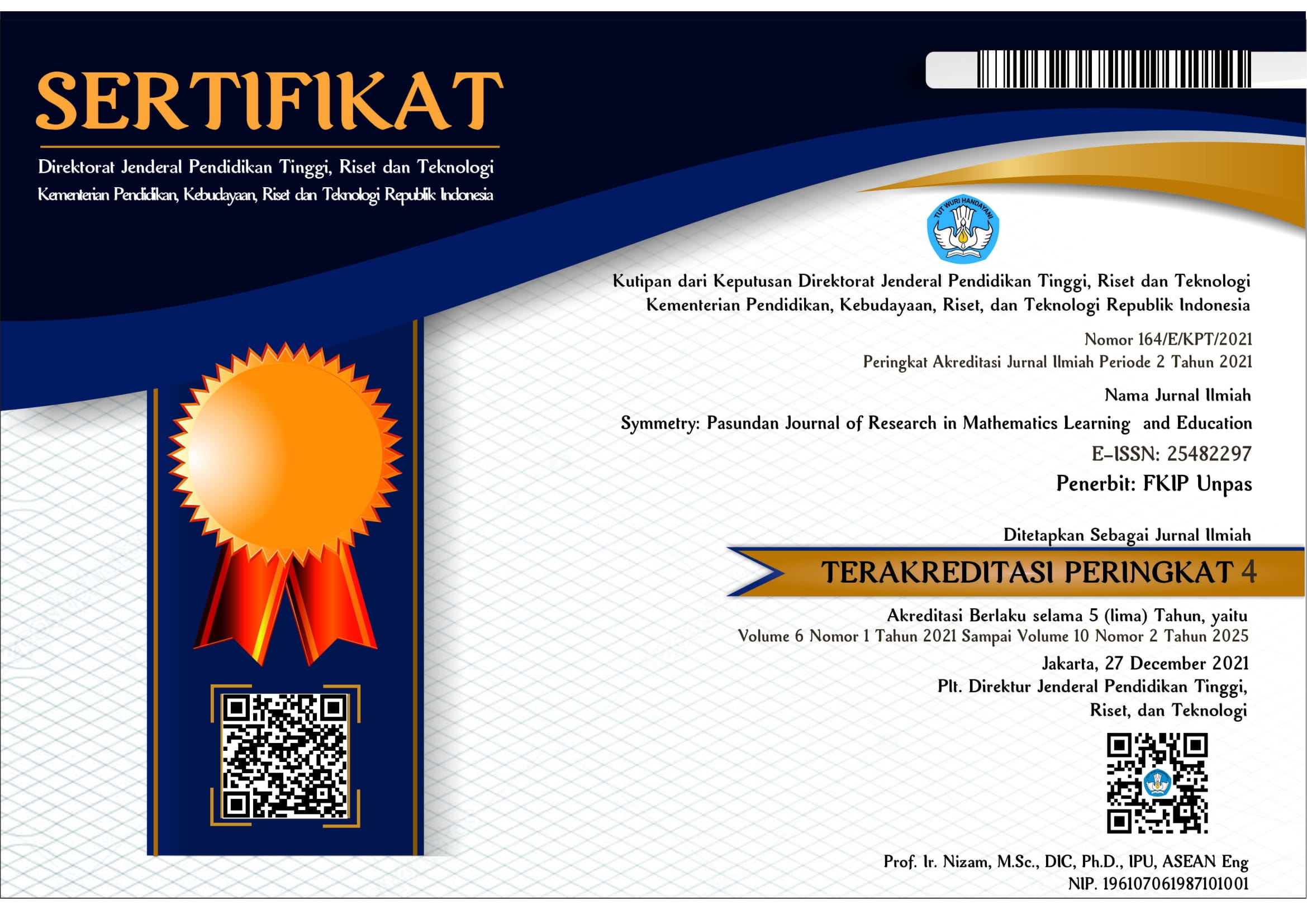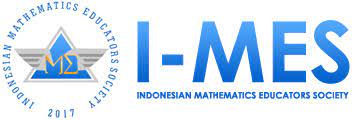Kemampuan Penalaran dan Komunikasi Matematis Berdasarkan Kemampuan Awal Mahasiswa Melalui E-Learning Berbantuan Program Maple
DOI:
https://doi.org/10.23969/symmetry.v7i2.6718Abstract
Mathematical reasoning and communication skills were added by NCTM and PISA as process standards in mathematics learning that received special attention. The population in this study were all students of Mathematics Education, Pasundan University. The sample in this study was two classes, namely semester 3. The research design used was One-Group-Pretest-Postest. The conclusions of this study include (1) the mathematical reasoning and communication abilities of prospective teacher students after receiving learning with e-learning assisted by the Maple Program are better than before receiving learning; (2) The mathematical reasoning ability of the superior group > moderate group > the low group significantly; (3) The increase in students' mathematical reasoning abilities is in the medium category. The increase in mathematical reasoning ability of the superior group > moderate group > the low group, only not significant; (4) The mathematical communication ability of the superior group > moderate group, it's justnot significant. The superior group > significant assessor group, and the moderate group > significant assessor group; (5) The improvement of students' mathematical communication skills are in a low category. Improved mathematical communication skills of the superior group > moderate group, and the superior group > the low group significantly. Medium group > low group, only not significant.
Downloads
References
Anggraena, Y. (2021). PISA 2021 DAN COMPUTATIONAL THINKING (CT). Jakarta: Pusat Kurikulum dan Perbukuan Kemdikbud
Arikunto, S. 2010. Prosedur Penelitian Suatu Pendekatan Praktik. Jakarta: Rineka Cipta.
Azmi, S. (2017). Penerapan Pendekatan Concrete-Representational-Abstract (Cra) Berbasis Intuisi Untuk Meningkatkan Kemampuan Komunikasi Matematik Siswa Smp. Aksioma 6 (1) 2017, 68-80.
Darta, Saputra J. , Eliyarti W., Putra B.Y.G., Kandaga T. (2021). Improvement of the Ability of Representation, Reasoning, and Self-Efficacy of Prospective Mathematics Teacher Students by Using Learning with A Scientific Approach. Journal of Physics. Conf. Ser. 1776 012002.
Gumiarti. (2014). Penerapan Asesmen Kinerja untuk Mengukur Kemampuan Komunikasi Matematis dan Kemandirian Belajar Siswa di Sekolah Menengah Kejuruan. Tesis UNPAS: Tidak diterbitkan
Izzati, N. (2012). Peningkatan Kemampuan Komunikasi Matematis dan Kemandirian Belajar Peserta didik SMP melalui Pendekatan Pendidikan Matematika. Disertasi UPI: Tidak diterbitkan.
Kurniasih, S., dkk. (2020). Menumbuhkan Kemandirian Belajar Matematika Siswa Melalui Mobile Learning Berbasis Android. JEMS (Jurnal Edukasi Matematika dan Sains), 8(2), 2020, 140-149.
Madio, S. (2016). Pengaruh Pembelajaran Berbasis Masalah Terhadap Kemampuan Penalaran Dan Komunikasi Matematis Siswa SMP Dalam Matematika. Jurnal Pendidikan Matematika 10 (2) 2016, 93-108.
Mahmudi, A. (2009). Komunikasi dalam Pembelajaran Matematika. Makalah Termuat pada Jurnal MIPMIPA UNHALU/ Vol.8.
Munir. (2008). Kurikulum Berbasis Teknologi Informasi dan Komunikasi. Bandung: Alfabeta.
Muslimahayati. (2019). Kemampuan Komunikasi Matematis Siswa dengan Pendekatan Pembelajaran Matematika Realistik Bernuansa Etnomatematika (PMRE). Jurnal Pendidikan Matematika RAFA 5 (1) 2019, 22-40.
OECD. (2021). PISA 2021 MATHEMATICS FRAMEWORK.
Saputra, J. (2015). Penggunaan Model Problem Based Learning Berbantuan E-Learning dalam Upaya Meningkatkan Kemampuan Pemecahan Masalah Matematis dan Dampaknya terhadap Kemandirian Belajar Mahasiswa Pasundan Journal of Mathematics Education 5 2 pp 77-88
Saputra, J. (2017). Penggunaan Model Problem Based Learning Berbantuan ELearning Terhadap Kemandirian Belajar Mahasiswa pada Dimensi Tiga. KALAMATIKA Jurnal Pendidikan Matematika, 2 (2), 117-130. DOI: http://dx.doi.org/10.22236/KALAMATIKA.vol2no2.2017pp117-130
Suherman, E. (2003). Evaluasi Pembelajaran Matematika. Bandung: CV Alfabeta
Sugiyono. (2017). Metode Penelitian Kuantitatif, Kualitatif, dan R&D. Bandung : Alfabeta, CV.
Sumarmo, U. (2010). Pengembangan Model Pembelajaran Matematis untuk Meningkatkan Kemampuan Intelektual Tingkat Tinggi Siswa Sekolah Dasar. Laporan Penelitian FMIPA UPI. Tidak diterbitkan
Yuni, Y. (2018). Peningkatan Berpikir Intuisi Dan Penalaran Matematis Melalui Pembelajaran Inquiry Berbasis Open-Ended. Prima: Jurnal Pendidikan Matematika 2 (2) 2018, 107-126
Downloads
Published
Issue
Section
License
Copyright (c) 2022 Symmetry: Pasundan Journal of Research in Mathematics Learning and Education

This work is licensed under a Creative Commons Attribution 4.0 International License.
Hak Cipta sepenuhnya ditangan jurnal.




















